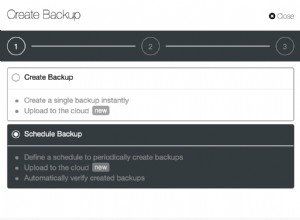Pasé un tiempo y finalmente se me ocurrió una solución funcional.
Lo publicaré aquí para referencia futura.
Solución
En primer lugar, tienes tres tablas (foo_table , bar_table , baz_table ) que apuntan a sus users tabla por medio de claves foráneas (llamadas user_id en todos los casos). Deberá reemplazar los ID almacenados en esas columnas de id a another_id . Así es como puedes hacerlo:
-- We are dropping the foreign key constraint on dependant table (in other case it will prevent us from updating the values)
ALTER TABLE foo_table DROP CONSTRAINT fk_e52ffdeea76ed395;
-- Then, we're swapping values in foreign key column from id to another_id
UPDATE foo_table T SET user_id = (SELECT another_id FROM users WHERE id = T.user_id);
-- And finally we're creating new foreign key constraint pointing to the another_id instead of id
ALTER TABLE foo_table ADD CONSTRAINT fk_e52ffdeea76ed395 FOREIGN KEY (user_id) REFERENCES users (another_id) ON DELETE CASCADE;
Deberá repetir las consultas anteriores para cada tabla dependiente.
Después de eso, todas las tablas dependientes apuntarán a su nuevo another_id columna.
Al final solo tendremos que reemplazar la clave principal:
-- 1. Dropping the original primary key
ALTER TABLE users DROP CONSTRAINT users_pkey
-- 2. Renaming existing index for another_id (optional)
ALTER INDEX uniq_1483a5e93414710b RENAME TO users_pkey
-- 3. Creating new primary key using existing index for another_id
ALTER TABLE users ADD PRIMARY KEY USING INDEX users_pkey
-- 4. Creating index for old id column (optional)
CREATE UNIQUE INDEX users_id ON users (id)
-- 5. You can drop the original sequence generator if you won't need it
DROP SEQUENCE users_id_seq
Incluso puedes soltar el id original columna si quieres.
Espero que ayude a alguien.




